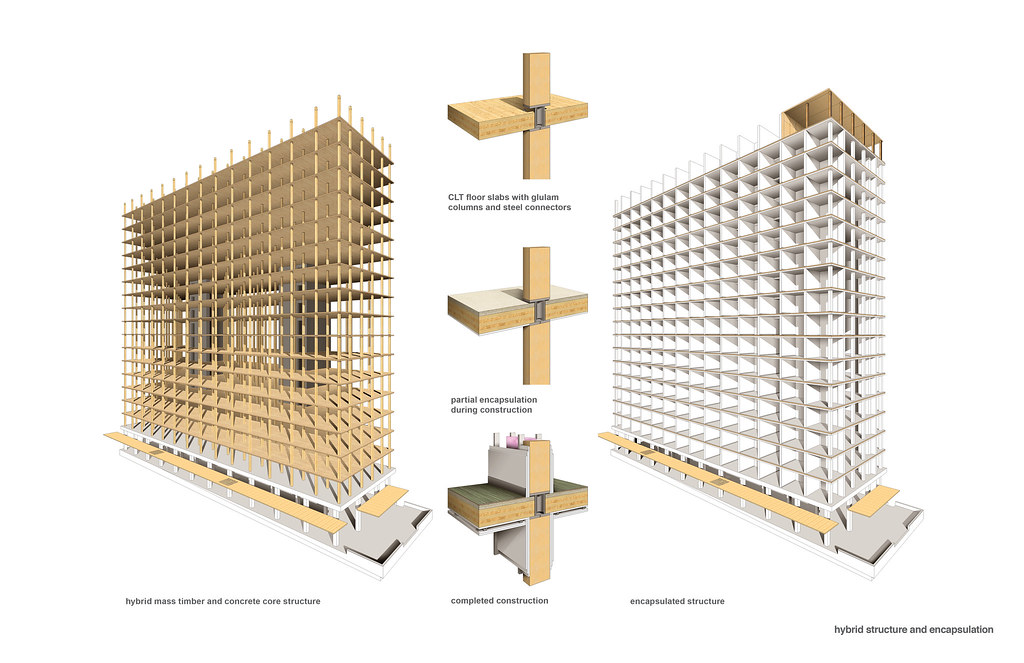The 2018 Code Conforming Wood Design (CCWD), a joint publication of the American Wood Council (AWC) and the International Code Council, is now available.
The free download summarizes key provisions related to the use of wood and wood products as they appear in the 2018 International Building Code (IBC). The publication compiles the occupancy and height and area provisions of the IBC for wood structures into one publication.
“The complexity and scope of the IBC makes it difficult for designers to know about all of the code provisions that affect the use of wood products in construction,” said Kenneth Bland, AWC vice president of codes & regulations, in a news release. “CCWD consolidates and provides additional explanation for many of those provisions to make wood building compliance with the IBC as simple as possible.”
Among the 2018 IBC code changes mentioned in the 2018 CCWD:
· Alternatives for protecting attics in buildings using an NFPA 13R automatic sprinkler system. This has specific application to construction designed in accordance with IBC Sections 510.2 and 510.4, based on the height of the roof above the lowest level of required fire department vehicle access.
· Provisions for a fire-watch during non-working hours when construction exceeds 40 feet in height above the lowest adjacent grade, if required by the fire code official. The International Fire Code contains additional fire watch provisions.
· Updated references to AWC’s 2018 National Design Specification for Wood Construction and 2018 Wood Frame Construction Manual.
Related Stories
| Oct 6, 2011
Taking tenant behavior into account on building energy codes
Over the past few years, Seattle, San Francisco, Austin, and Washington, D.C., have passed laws requiring property owners to measure and disclose their energy use, which would help place a market value on a building’s efficiency and provide a benchmark for improvements.
| Oct 6, 2011
Constructed properly, green roofs hold up well in a hurricane
The heavy rains and high winds of Hurricane Irene didn’t cause any problems for a Con Edison green roof in New York City. The roof contains sedum, a plant that adapts well to drought and handles periods of heavy rain well.
| Oct 6, 2011
RoofPoint: A new green standard for roofs
Structured much like other rating systems, RoofPoint, establishes green standards specifically for roofs.
| Oct 6, 2011
Roofers critical of new OSHA harness rules
Roofers say a new OSHA rule requiring all residential roofers to wear a safety harness makes workers less safe, and is causing lost business for those who comply with the rule.
| Oct 6, 2011
Florida county proposes saving on construction costs by trumping city regulations
This summer, Pinellas County, FL wanted to save money on an $81 million public safety complex in Largo by using the county’s own building regulations and permit fees, not the city’s more expensive fees.
| Sep 30, 2011
OSHA Releases New Nail Gun Safety Document
The Occupational Safety and Health Administration and the National Institute for Occupational Safety and Health have developed a new guidance document, Nail Gun Safety—A Guide for Construction Contractors.
| Sep 30, 2011
Cement Industry Advocates For Environmental Regulatory Relief
EPA regulations impacting the cement industry could force the closure of 18 of the nearly 100 US cement plants and cost 4,000 manufacturing jobs .
| Sep 30, 2011
IRS Releases New Rule On Reclassifying Independent Contractors
The Internal Revenue Service (IRS) has a new Voluntary Classification Settlement Program that allows an employer to reclassify independent contractors as employees if those workers previously were misclassified.
| Sep 29, 2011
Illinois Grapples With Definition of ‘Clean’ Construction Debris
The Illinois Pollution Control Board holds hearings this week about construction debris rules proposed by the state Environmental Protection Agency.
| Sep 15, 2011
Alabama Prepares First Statewide Residential Building Code
Following a series of devastating tornadoes that ripped through Alabama on April 27th, the state is preparing to implement the first statewide building code for residential structures.







